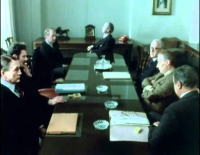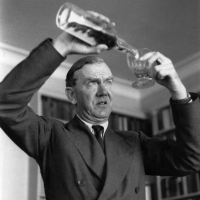Nobody does it better - Kim Philby in Fiction
Published on 12th June 2020
 Two classic post-war novels, Tinker, Tailor, Soldier, Spy by John le Carre and The Human Factor by Graham Greene and two contrasting judgments of the British establishment’s nemesis, Kim Philby. Suave, sophisticated, and a Soviet spy: Philby was hero-worshipped by his contemporaries in the pubs and clubs frequented by the British Intelligence Service and the ‘Old Boy’s Network’.
Two classic post-war novels, Tinker, Tailor, Soldier, Spy by John le Carre and The Human Factor by Graham Greene and two contrasting judgments of the British establishment’s nemesis, Kim Philby. Suave, sophisticated, and a Soviet spy: Philby was hero-worshipped by his contemporaries in the pubs and clubs frequented by the British Intelligence Service and the ‘Old Boy’s Network’.
The betrayal of the British ruling class, the class that had once ruled an Empire was most keenly felt by his friends to such an extent that they refused to believe him to be a traitor even after Philby tipped off Burgess and Maclean that they’d been rumbled (the more petit bourgeois MI5 believed he was a traitor in 1951). Despite all the evidence, Philby remained in situ within the Intelligence Service where his effortless charm and perfect Establishment credentials laid bare the dogmatic Imperial assumptions that bedevilled the British ruling classes and its new geo-political role. Explanations regarding Philby’s betrayal can be divided into two camps: the first and more prevailing view is that Philby’s treachery was borne from selfishness - Philby enjoyed the thrill of playing both sides - spying as sport. The second view is that Philby was a committed Marxist-Leninist and was exercising politically sound praxis - his was an honourable act.
 It is the sense of Philby’s selfishness that informs John le Carre’s Tinker, Tailor Soldier, Spy (1974). The novel’s main protagonist, George Smiley is summoned back to ‘The Circus’ to root out a Soviet spy lurking at the heart of the British Establishment. Smiley is the opposite of Philby in almost every sense. Whereas Philby was clubbable, Smiley is shy and introverted - Philby was dashing and handsome, Smiley is donnish, cuckolded, small and fat. The traitor, ‘Gerald the Mole’ is portrayed as prideful and arrogant, an opportunist whose treatment of friends is the opposite of the mores of a ‘British gentleman’. Le Carre’s view of Philby is well documented - he considered him to be traitor and a murderer, a loathsome creature- the antithesis of the compassionate and reserved George Smiley, the true ‘British Gentleman’.
It is the sense of Philby’s selfishness that informs John le Carre’s Tinker, Tailor Soldier, Spy (1974). The novel’s main protagonist, George Smiley is summoned back to ‘The Circus’ to root out a Soviet spy lurking at the heart of the British Establishment. Smiley is the opposite of Philby in almost every sense. Whereas Philby was clubbable, Smiley is shy and introverted - Philby was dashing and handsome, Smiley is donnish, cuckolded, small and fat. The traitor, ‘Gerald the Mole’ is portrayed as prideful and arrogant, an opportunist whose treatment of friends is the opposite of the mores of a ‘British gentleman’. Le Carre’s view of Philby is well documented - he considered him to be traitor and a murderer, a loathsome creature- the antithesis of the compassionate and reserved George Smiley, the true ‘British Gentleman’.
Philby’s double-life can be seen in Graham Greene’s own cleaved ideology: at once he was England’s most famous converted Catholic (until Tony Blair) at another he was a Communist sympathiser. This duality of conscience and ideologies perhaps imbues Greene’s The Human Factor (1979) with a more empathetic view of Philby’s perceived treason. The great betrayal in Greene’s novel lies with less with Maurice Castle’s ‘honourable’ spying on the Soviet Union’s behalf but in the British Establishment’s covert support of the South African apartheid regime. Castle longs for retirement and the quiet life, however his antipathy for the racist policies and Afikaner Nationalism of the South African government lead the novel’s protagonist to a principled and moral judgement to betray the British establishment.
 Greene, who was an acquaintance of Philby’s and wrote the foreword to Philby’s autobiography My Silent War questions the moral certainties associated with treason. Consider Sir Robert Casement: to many he was in the vanguard of fighting to bring to heel the wickedness British Imperialism, to others he was a traitor who stabbed his country in the back at the time of its gravest need. A square in the Yasnevo district in Moscow was renamed in Kim Philby’s honour in 2018, close to the old KGB headquarters.
Greene, who was an acquaintance of Philby’s and wrote the foreword to Philby’s autobiography My Silent War questions the moral certainties associated with treason. Consider Sir Robert Casement: to many he was in the vanguard of fighting to bring to heel the wickedness British Imperialism, to others he was a traitor who stabbed his country in the back at the time of its gravest need. A square in the Yasnevo district in Moscow was renamed in Kim Philby’s honour in 2018, close to the old KGB headquarters.
Access eBooks/eAudiobooks on your phone, tablet or reader. Once you have installed the app, search for Dublin in the ‘Library’ field provided and then sign in using your library membership card number and PIN. Watch our how to video on Borrowbox. Members of other library authorities will need to log in using a different link.
Submitted by Tom in Drumcondra Library.
